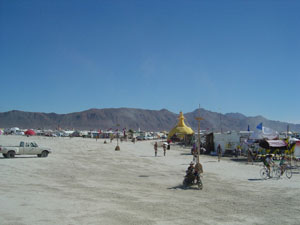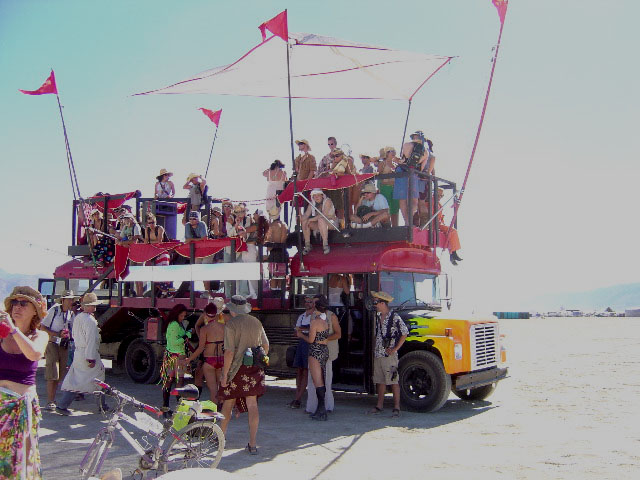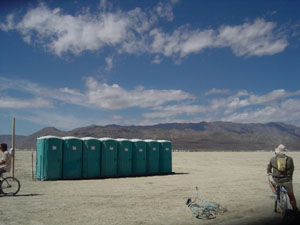
The Costly Evolution of a Large Beast
by J. Gabriel Lloyd
Burning Man is now an event that most participants feel is a huge enterprise, easily filling the pockets of the creators allowing them luxury and ease of living. A life of luxury is not a reality for the creators of the event. Cynicism for the creators reared its timid head this year (2004) with mock flyers in every single porta-potty telling of a fiesta BBQ dinner for all. Word got around fast, and the 2pm BBQ time was met with a dry erase board reading, “No BBQ today! The flyers are a hoax!”
Why would participants that thrive upon this week hold contempt for the creators? It all comes back to money. Money is exchanged in order to enter Black Rock City. Larry Harvey considers it a “tax”. Participants consider it an expensive ticket. I bought early this year and my tax was a few dollars north of two hundred. Participants are not stupid people, and with a little math their algebra takes them to formulas such as this: Each participant pays around $200/person. There are 35,000 participants. Multiply $200 by 35,000 to see how much money is brought into the pockets of the creators. Answer: Roughly $7,000,000.
It is a safe bet to estimate that 85% or more of the Burning Man population will not earn this amount of money each year in their lifetime. To them, this is a large chunk of change that can take them to places known as Tahiti or Morocco every day of the year for the rest of their lives.
Reality check: Burning Man is a business. Campmate Jeff, from San Francisco, assists small start up businesses as his living. My first night at camp I was expressing my cynicism for the tax, while Jeff was talking about the possibilities of growing the event for the sustainability of Burning Man. The growth of the event was “for a variety of reasons, not the least of which was they probably needed to make more money if they were going to live off of it, and I’m not talking about getting rich, I’m just talking about paying salaries.”
“Yeah, I’m sure it does at this point,” I interjected.
“No,” Jeff replied, “I don’t think it does.”
I protested that $200 a pop for 30,000 people would give
you at least $6,000,000.
“$6,000,000, that’s your whole budget for the year. That’s
peanuts…[start-up companies] burn a million dollars a month, easy,”
Jeff said.
My thoughts at this point were how companies are entities that function at full throttle year round. Burning Man does not function at full throttle year round. At best it is only at its peak for three months of the year including set up and take down.
“[The companies I advise] are small… they have,
like, 30 people, 40 people…they’re burning $2,000,000 a month.
[Burning Man] has way more than 30 people… and when this thing is going
they have hundreds of people.
“This year the DPW guys, the guys that do the heavy lifting…are
working for food….Nobody is getting rich off [Burning Man].”
Not only are there 30 or more full time employees to pay, but a multitude of other expenses:
--A $1,000,000 land use fee imposed by the US Government for use of the barren land.
--Three divisions of law enforcement: State, Local and County
--Sanitation for the porta-potties
--Electricity at the site
--Water trucks to keep the dust down
Each of these listed could potentially cost $1,000,000 or more, and then you still have underlying costs.
Popular Consensus
Walking through the event and talking to people about general operation of the event and what they felt about it, the conversation always came back to the revenue. An unknown person on one of my tapes expressed, “I have a tough time knowing that this event pulls in somewhere between 6 and 8 million dollars of revenue and Larry having all these lofty moral goals, but at the same time the guy is obviously pocketing some fucking doe.” After explaining what I had heard regarding costs for the event, however, this individual and others felt a little more comfortable about the costs. My friend Jeff from camp (not Jeff with the business background, but Jeff from Huntington Beach) adds, “[Larry is] not cashing in off this; he’s having a good old time…he’s a good going guy…He’s looking at the benefits of…[the money] going towards everybody, not just himself.”
Larry does make a little money off the event, but he oversees the entire event. Jeff added, “He comes out a head, but he’s not sitting out there milking it; he’s not doing that MTV shit…he’s a good guy.”
Larry is also very aware of the ramifications of having a corporate sponsor for the event. Corporations are not well loved at Burning Man, for many people go to the event to get away from them. I met a whole camp of computer engineers that work for Google who come every year to just relax and not be a part of that doldrum. The temptations for having corporate sponsors for the event, if you need money, are huge, however. If Budweiser were to sponsor the event, the organizers would most assuredly have enough revenue to cover all the operation costs at their current rate. Larry is constantly asked to consider sponsorship and he always adamantly says no. “I think [not having corporate sponsors is why] people don’t really have a problem paying $200 a ticket,” another unidentified participant interjected, “because, I mean, you know there is no corporate sponsor out there.” Introducing the corporate sponsorship would bring in a new crowd, but also significantly change the dynamic of the event. Jeff finished the thought by saying, “[Larry is] basically doing this [event] so that we all have a good time. That’s what it comes down to. Make sure we’re all fucking cool. Make sure everything is clean and we’re having a good old time.”
(article continued here)




